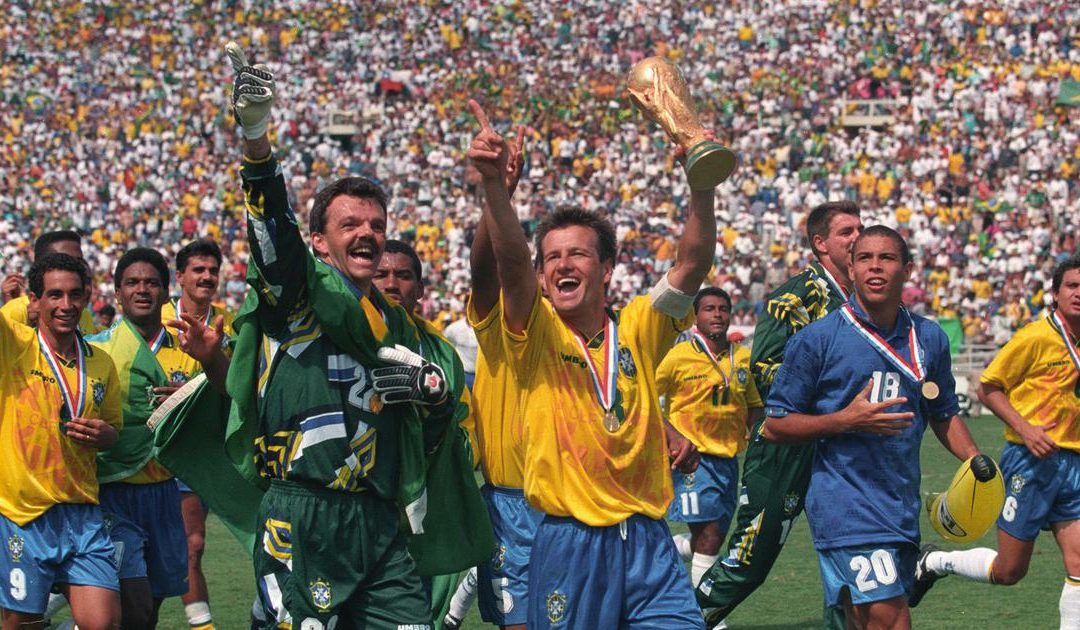After 24 years of glorious failures, Brazil finally captured a record fourth World Cup in the United States of America in 1994. Today we look back at their journey.
Brazil had never sweated so much to participate of a World Cup. Until the 1980s, the World Cup qualifying was little more than a formality to Brazil. Brazil was so clearly superior that most other South American countries were more concerned in losing by little to actually beating Brazil. Moreover, the teams were divided in groups; the stronger teams (Brazil and Argentina) were seeded, and wouldn’t play against each other. In 1994, things changed a little: the ten South American countries were divided in two groups of five teams each. Brazil would play against Ecuador, Bolívia, Venezuela and Uruguay. The first match was a draw with Ecuador, 0-0. Then, on July 25th 1993, a sad event: for the first time in History, the Brazilian football team lost a match in the qualifying for the World Cups; playing in La Paz, 3,600 meters of altitude, Bolívia beat Brazil by 2-0. Brazil only secured a place in the last round of the Qualifiers. The last match would be against Uruguay, in Maracanã, on September 19th 1993. Brazil needed only a tie, and was favorite to win; however, Uruguay is always a tricky adversary, and many times had surprised Brazil (the most obvious, of course, the victory in the final match of the 1950 World Cup); one month earlier, Brazil and Uruguay had tied 1-1 in Montevideo. Brazil had played the first seven qualifying matches without star striker Romario. Owing to differences & disciplinary problems, Coach Carlos Alberto Parreira has banned him. Although Before the match against Uruguay, Parreira gave up and called Romário. Brazil won by 2-0, and Romário scored the two goals.
Parreira’s philosophy could be summarized as (he never denied it): first, have a strong defense to save goals; then, if possible, have an attack to score goals. Brazil seemed to have a good defense line, with Jorginho, Mozer, Ricardo Gomes, Ricardo Rocha and Leonardo. In the middle field, Parreira put his pet player, Dunga, who better than anyone personified the spirit of that team: plently of force with little of talent; to help Dunga, there was strong Mauro Silva.
Parreira would leave the creativity functions to Raí, who had led São Paulo F.C. to a double world club championship in Tokyo. In the attack, Brazil would depend on only two players: Bebeto and Romário. Aldair and Márcio Santos formed probably the most solid center-backs of Brazil ever. Brazil ended the Cup with only three goals against (two in one match, against Holland), much thanks to the good performance of these two players. In the middle, Raí let everybody down. Despite all support and opportunities, he simply could not play well, and was substituted by Mazinho. And, if Márcio Santos and Aldair were doing a good job in the defense, Bebeto and Romário were doing an excellent job in the attack. Because of Parreira’s defensive mentality, Brazil scored only eleven goals in 1994; of these, Romário scored five and Bebeto three.
Brazil won the first nervous match against Russia by 2-0. Romário scored first, Raí, kicking a penalty, scored the second. Second match Brazil won 3-0 Cameroon. Romário, Márcio Santos and Bebeto scored. Brazil tied the following match, against Sweden, thanks to an individual play of Romário’s. Brazil moved to the next stage. On July 4th 1994, Brazil would play against the USA. Brazil would normally win easily, but the Americans were playing at home, on their National Day.
In the first half, Leonardo, left-defense, hit his elbow violently against an American player; Leonardo was sent off immediately, which increased Brazil’s uncertainty. Brazil won that match thanks to the usual: Aldair and Márcio Santos effective in the defense, Romário and Bebeto effective in the attack. Bebeto scored the sole goal at 28 minutes of the second half.
Next, Brazil beat Holland. In the second Brazilian goal, Romário was clearly off side, but he pretended he had not seen the ball; the referee considered that Romário was not participating of that play, and Bebeto scored. The match was an easy 2-0 for Brazil, but in ten minutes Holland scored two goals. Then, in a long free kick, Branco scored; Branco was a veteran, who had participated of the cups in 1986 and 1990, who was much admired by the Brazilians for his boldness. FIFA considered this Brazil x Holland to be a classic match. Brazil won the semi-final against Sweden by 1-0, with a good performance by the defenders and a goal by Romário. Brazil and Italy played the final of the 1994 World Cup. This time, not even Romário could help Brazil win. For the first time in the History of World Cups, a final match ends in 0-0, and must be decided in penalty kicks. This happened because both Brazil and Italy had a scheme which privileged first the defense, and, luck allowing, the attack. Brazil won in the penalties. The Italians missed three of four kicks. Brazil was four times champion. Brazilians refer to this cup as the Cup that Romário won for Brazil.
![]()

